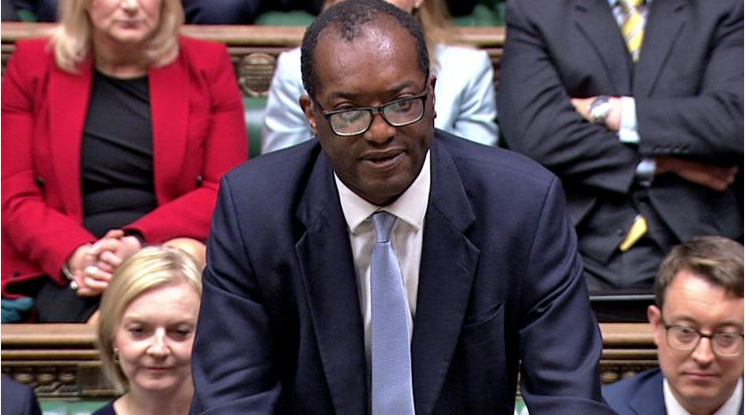Mini-budget: Huge tax cuts announced
Chancellor Kwasi Kwarteng has announced a tax-slashing ‘mini-budget’ comprising of £45 billion of cuts, and a huge welfare system shake-up.
He outlined his plans to MPs in the Commons in an emergency announcement on Friday, as Liz Truss’ government set out its plan to tackle the rising cost of living and tame inflation.
Mr Kwarteng introduced a package of measures, including: stamp duty cuts, cancelling a planned corporation tax rise, and confirming help for households and businesses struggling with soaring energy bills.
A huge increase in government borrowing will fund the tax cuts for the plan, which Mr Kwarteng said would deliver higher wages, greater opportunities and fund public services.
But critics claim the government’s approach reveals a misguided faith in “trickle-down economics” – the idea cutting taxes for the wealthy and for businesses will ultimately benefit all.
Labour’s shadow chancellor Rachel Reeves told the Commons: “The only things that are going up are inflation, interest rates and banker bonuses.”
The Bank of England raised interest rates on Thursday to 2.25% from 1.75% –the highest rate-level since the 2008 financial crisis – with the Bank warning the UK may already be in a recession.
So, how will the changes affect you?
Energy costs
Mr Kwarteng outlined the government’s previously announced plans to tackle soaring energy bills, and announced the government would guarantee a safety net for energy firms.
– Households
He reiterated the government’s plans to cut household energy bills by an expected £1,400 this year while millions of the most vulnerable households will receive additional payments, taking their total savings this year to £2,200.
He also reaffirmed the government’s commitment to the £400 energy bills discount, with a series of instalments beginning in October.
– Businesses
The Chancellor also outlined the government’s plans to help businesses, which don’t benefit from an energy price cap.
The government’s Energy Bill Relief Scheme is set to reduce wholesale gas and electricity prices for all businesses, charities and public sector premises like schools and hospitals.
“This will provide a price guarantee equivalent to the one provided for households, for all businesses across the country,” Mr Kwarteng told MPs.
He added that “energy prices are currently extremely volatile, erratically rising and falling every hour” – creating risks for energy firms.
Income tax
The chancellor has cut the basic rate of income tax early, and abolished the additional rate altogether.
Mr Kwarteng announced the government would cut the basic rate of income tax to 19p in April 2023 – which is one year early, and would affect 31 million people.
He also axed the additional rate of income tax, which is currently set at 45% for earners on salaries of more than £150,000.
Mr Kwarteng said the figure for those top-earners is higher than the headline top rate in other G7 countries.
The additional rate would be replaced by a single higher rate of income tax of 40%, he said.
Mr Kwarteng told MPs: “This will simplify the tax system and make Britain more competitive. It will reward enterprise and work. It will incentivise growth. It will benefit the whole economy and the whole country.”
Stamp Duty
The chancellor also confirmed the government’s plans to make cuts to stamp duty, telling the Commons: “Home ownership is the most common route for people to own an asset, giving them a stake in the success of our economy and society.”
Currently, buyers do not pay stamp duty on the first £125,000 of a property’s value.
The government is doubling that threshold to £250,000.
Mr Kwarteng also said the stamp duty threshold for first-time buyers would be increased from £300,000 to £425,000.
The government is also increasing the value of the property on which first-time buyers can claim relief from stamp duty, from £500,000 to £625,000.
Mr Kwarteng said these steps would mean an increase of 200,000 more home buyers annually who won’t have to pay stamp duty.
Adding the cut was permanent, and effective from today.
Ms Reeves criticised the move, saying it would not benefit first home-buyers struggling to get a foothold in the market.
National Insurance hike reversed
The chancellor had already announced on Thursday that the government will reverse the recent 1.25% increase in the National Insurance contribution rate from November 6.
Mr Kwarteng’s predecessor Rishi Sunak announced the rise, which came into effect in April, to help fund the strapped health and social care system.
Speaking in the Commons today, the chancellor confirmed to MPs the health and social care levy introduced by Boris Johnson’s government would be axed.
The Chancellor said this, and other planned rises in national insurance contributions, would be cancelled from “the earliest possible moment” – November 6.
Welfare system shake-up
More than 100,000 people in part-time work could face a benefit cut if they don’t actively seek more work, the government announced earlier this week.
Claimants working up to 15 hours a week on the National Living Wage will be required to meet regularly with a work coach and to take “active steps” to increase earnings, the chancellor said.
If they fail to do so, their benefits could be reduced, under the new plans.
It will be an increase from the incoming 12-hour threshold for a more intensive work search regime and will take effect from January as part of the Universal Credit system.
Claimants aged over 50 will also get extra support from work coaches, while the newly unemployed will receive nine months of targeted sessions.
The Treasury believes that rising economic inactivity among the over-50s is contributing to a shortage in the jobs market, driving up inflation and limiting growth.
Strikes
The UK has seen a wave of strikes by workers, including rail and postal staff, calling for better and pay and conditions across industries this year.
Mr Kwarteng said it is “simply unacceptable” for strike action to disrupt lives, telling MPs the Government will seek to introduce minimum service levels.
He added: “We will legislate to require unions to put pay offers to a member vote to ensure strikes can only be called once negotiations have genuinely broken down.”
Corporation tax cut
The Chancellor also confirmed the government was cancelling its planned corporation tax rise.
The UK’s corporate tax rate will not rise to 25% – it will remain at 19%.
Mr Kwarteng said the UK would have the lowest corporation tax in the G20, claiming that this would plough almost £19 billion a year back into the economy.
Bankers’ bonus
Mr Kwarteng was heckled by opposition MPs and cheered on by his own side as he confirmed controversial plans to get rid of the cap on bankers’ bonuses.
He said the government wanted to invigorate the City of London, to drive growth in Britain’s financial services sector by attracting.
Currently, bankers’ bonuses are capped at double their salary – or triple, subject to shareholders’ approval.
The government will lift that cap entirely, placing no limits on the size of bankers’ bonuses.
Mr Kwarteng argued that the bonus cap had only driven up bankers’ basic salaries.
What else has been announced?
- UK to introduce sales tax-free shopping for overseas visitors
- Duty rates for beer, cider, wine, and spirits axed









